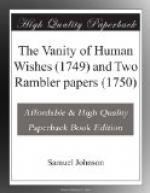If now and then they condescend to inform the World of particular Facts, they are not always so happy as to select those which are of most Importance. I know not well what Advantage Posterity can receive from the only Circumstance by which Tickell has distinguished Addison from the Rest of Mankind, the Irregularity of his Pulse: nor can I think myself overpaid for the Time spent in reading the Life of Malherb, by being enabled to relate, after the learned Biographer, that Malherb had two predominant Opinions; one, that the Looseness of a single Woman might destroy all the Boast of ancient Descent; the other, that the French Beggers made use very improperly and barbarously of the Phrase noble Gentleman, because either Word included the Sense of both.
There are, indeed, some natural Reasons why these Narratives are often written by such as were not likely to give much Instruction or Delight, and why most Accounts of particular Persons are barren and useless. If a Life be delayed till all Interest and Envy are at an End, and all Motives to Calumny or Flattery are suppressed, we may hope for Impartiality, but must expect little Intelligence; for the Incidents which give Excellence to Biography are of a volatile and evanescent Kind, such as soon escape the Memory, and are rarely transmitted by Tradition. We know how few can portray a living Acquaintance, except by his most prominent and observable Particularities, and the grosser Features of his Mind; and it may be easily imagined how much of this little Knowledge may be lost in imparting it, and how soon a Succession of Copies will lose all Resemblance of the Original.
If the Biographer writes from personal Knowledge, and makes haste to gratify the publick Curiosity, there is Danger left his Interest, his Fear, his Gratitude, or his Tenderness, overpower his Fidelity, and tempt him to conceal, if not to invent. There are many who think it an Act of Piety to hide the Faults or Failings of their Friends, even when they can no longer suffer by their Detection; we therefore see whole Ranks of Characters adorned with uniform Panegyrick, and not to be known from one another, but by extrinsick and casual Circumstances. “Let me remember, says Hale, when I find myself inclined to pity a Criminal, that there is likewise a Pity due to the Country.” If there is a Regard due to the Memory of the Dead, there is yet more Respect to be paid to Knowledge, to Virtue, and to Truth.
LONDON: Printed for J. PAYNE, and J. BOUQUET, in Pater-noster-Row, where Letters for the RAMBLER are received, and the preceding Numbers may be had.
PUBLICATIONS OF THE AUGUSTAN REPRINT SOCIETY
First Year (1946-1947)
1. Richard Blackmore’s Essay upon Wit (1716), and Addison’s Freeholder No. 45 (1716). (I, 1)
2. Samuel Cobb’s Of Poetry and Discourse on Criticism (1707). (II, 1)




